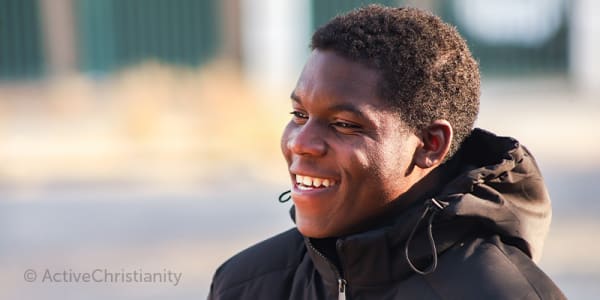God’s Word and God’s wisdom are full of righteousness. “You are God. Your throne will last forever and ever. Your kingdom will be ruled by what is right.” Hebrews 1:8 (NIRV).
Jesus was the happiest man on earth because He loved righteousness, as is written in Hebrews 1:9. Righteousness is to do what is right in God’s eyes. It brings blessing. It brings peace and joy. It is a law of God’s kingdom. So, learning righteousness gives huge rewards, both for this life and for all eternity. It affects not only us but the people around us - the society we live in.
Here are some of the rewards that we get if we follow after righteousness with all our hearts:
A joy in knowing what is coming
To be righteous is to do what is right and good in God’s eyes. At first, it can look as if doing righteousness is a disadvantage, but in the long run, there is a huge reward.
Think about the life of someone that wants to become a professional football player. He knows that he has to do certain exercises and eat certain healthy foods if he is going to be in good shape. Even if on some days he just wants to eat whatever he feels like eating, he decides not to do it when he remembers his goal – to become a great football player. And afterwards he is very happy that he made the right choice. But if he had made the wrong choice, he would have been sorry afterwards.
It is the same in every area. Righteousness brings a joy that goes much deeper than the very short period of “joy” that we experience when we give in to sin. If we always choose righteousness, we can look forward to a hopeful future (Jeremiah 29:11) that is far more interesting than a life full of bad choices and waiting in fear for the horrible results that will have to be harvested. Righteous deeds are investments for the future!
Perfect rest and peace that cannot be shaken
Jesus became the Prince of Peace, and before He left this earth, He said to His disciples, “I am leaving you with a gift—peace of mind and heart. And the peace I give is a gift the world cannot give.” John 14:27 (NLT).
Think about when Jesus stood before Pontius Pilate. How was it possible that He could stand there in perfect rest when they were all accusing Him? (Matthew 27:11-14.) How was it possible that He was thinking about His mother and John, even while He was hanging on the cross? (John 19:25-27.) How did He manage to do that?
The secret was that He had received peace by giving up His own will – His own likes and dislikes. For Jesus, righteousness was to give up His own will to do God’s will. (Hebrews 10:7.) Righteousness was to refuse to take any honour for Himself, because all honour belongs to God. Jesus was the most righteous person that had ever lived, and He suffered as the just for the unjust, which is us, and by doing that, He could bring us to God. (1 Peter 3:18.)
As disciples, we now have the chance to go the same way that Jesus went, and by following Him, we can get the same joy and peace that Jesus had – a peace that could not be shaken by anything or anybody in any circumstance! (John 15:11.)
You might think, “I’m righteous, because all my money matters are in order. I pay all my bills.” But maybe you are still full of demands or expectations that others should do this or that. Maybe you are full of unrest because of other people’s unrighteousness.
But the righteousness that Jesus came with is not a human righteousness. It goes much further than human righteousness. That is why the peace and rest that comes from the “righteousness which is from God by faith” (Philippians 3:9) can’t even be compared to the limited joy that comes from only doing what is right according to the law or human morals.
God’s righteousness is to do what is good and right in God’s eyes, in all areas. I avoid so much stress in this way, because then I am living to please Him and I no longer have to fight for my own benefits. I don’t need to fight for my own honour, money, or even for my own self-righteous thoughts. What a liberating reward! And what will my long-term reward be? God will tell us, “Well done, good and faithful servant,” as it’s written in Matthew 25:23. To hear that one day, will be worth far more than any earthly reward we can imagine now.
Righteousness breaks down our destructive self-will
Righteousness means that we don’t do our own will. The goal for a disciple is to have the same mindset that Jesus had: “Look, I have come to do your will, O God—as is written about me in the Scriptures,” and, “I want your will to be done, not mine.” Hebrews 10:7 (NLT) and Luke 22:42 (NLT). We see from this that our self-will and God’s will have nothing in common. They don’t mix or overlap at all. Our own will must be rejected so that God’s will can be done. That is righteousness in God’s eyes.
Our self-will is everything that puts “Me” first and often causes harm to somebody else. That is the will we are born with. Most people never grow out of this stage. Outwardly, they let things look better than they are. But why is there conflict? Why is there unrest? Why are there wars and difficulties both in the home and in the world in general?
My own will is full of unrighteousness, no matter how I try to hide it. The other person has their own will and I have my will, and then I think, “If you could just do my will, then we could be good friends.” But that thought is a big lie. That’s where conflict comes from. (James 4:1-2.) The human self-will causes a lot of problems in the world.
When I begin to see how much of a problem my self-will is, then rejecting it to do God’s will becomes a great benefit for myself and for those around me.
Do you have a care for people? Do you want to make things good in your home, in your local community, or in the society where you live? If so, then growing in this righteousness – in giving up your own will and doing God’s will instead – will be an enormous benefit to your family, your neighbours, your friends, your colleagues, humanity in general, and your future, both in this world and in eternity!
Perfect unity and peace with every single person
Earlier we saw that the football player had a goal, a vision, and that was to become a professional football player. For us, this vision is that from my side - in my life - the conflict and difficulties between me and other people can be completely solved through righteousness, God’s righteousness.
What a way to live! It is perfectly possible to have it like this: “For my part, everyone can stay exactly the way they are.” When you think about the vision to become a person who has no conflict with anybody or anything – no inner conflict and unhappiness – then that vision gives us the power to do what is necessary today, to say No to ourselves and to follow Jesus. (Luke 9:23.)
This is the same vision that Jesus had. He had looked down on the earth and seen all the conflict. Conflict in the homes, and conflict everywhere else. People, who were created to be like God Himself, were running around killing each other, offending each other and being nasty to one another. That is why Jesus came to earth and showed by His own example that we can work together in peace and unity if we give up our human self-will to do God’s will. (Ephesians 4:1-6; Ephesians 4:11-16; John 17:20-23; Ephesians 2:14-16; 1 John 1:6-7.)
The joy that Jesus was looking forward to was that there would be brothers and sisters living together in perfect unity. (Hebrews 12:2; Psalm 133.) For most people, differences automatically lead to conflict. (James 3:16; James 4:1-2.) But in God’s kingdom, differences can lead to a peace that is unheard of on this earth.
The greatest reward for choosing a life of righteousness is what Jesus prayed in John 17:21-23 - that we may be one just as the Father and Son are one. Think about what can be done when there is such a perfect unity amongst people!




